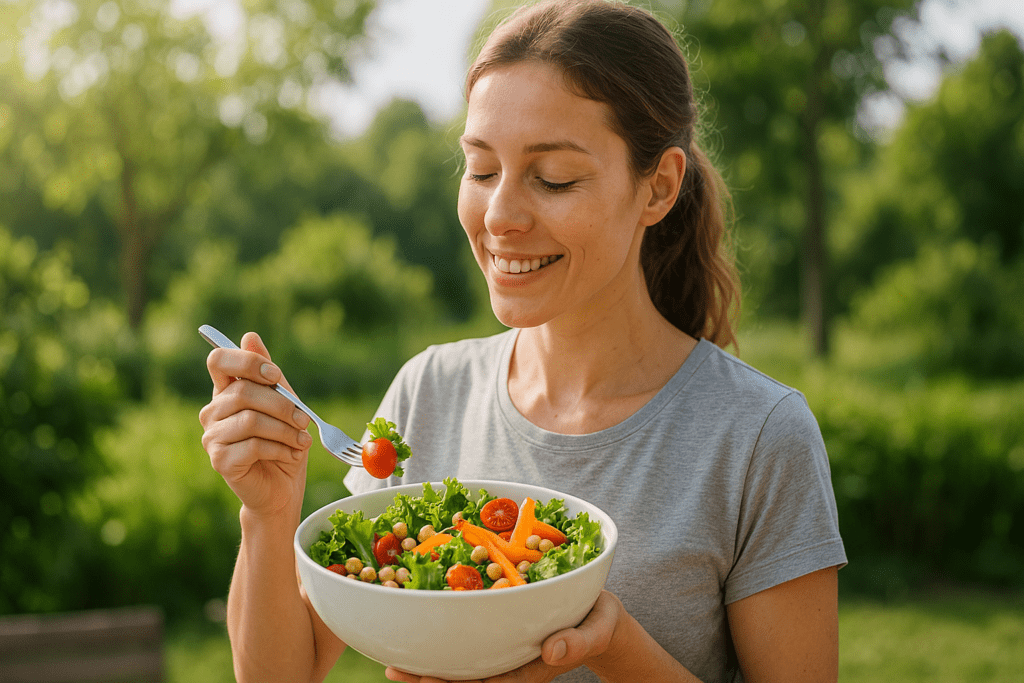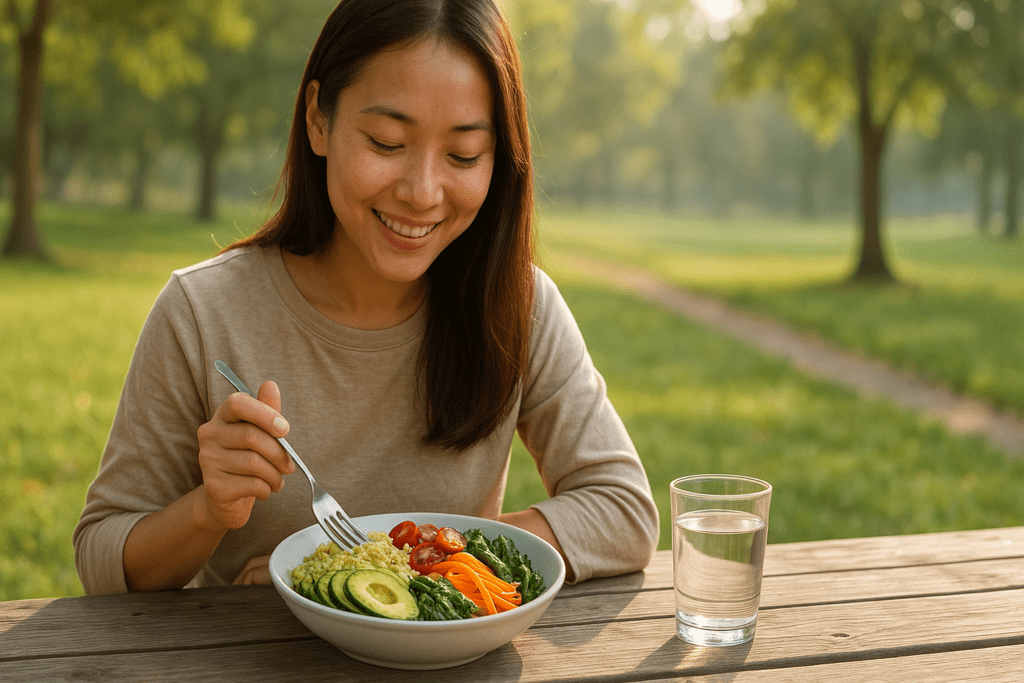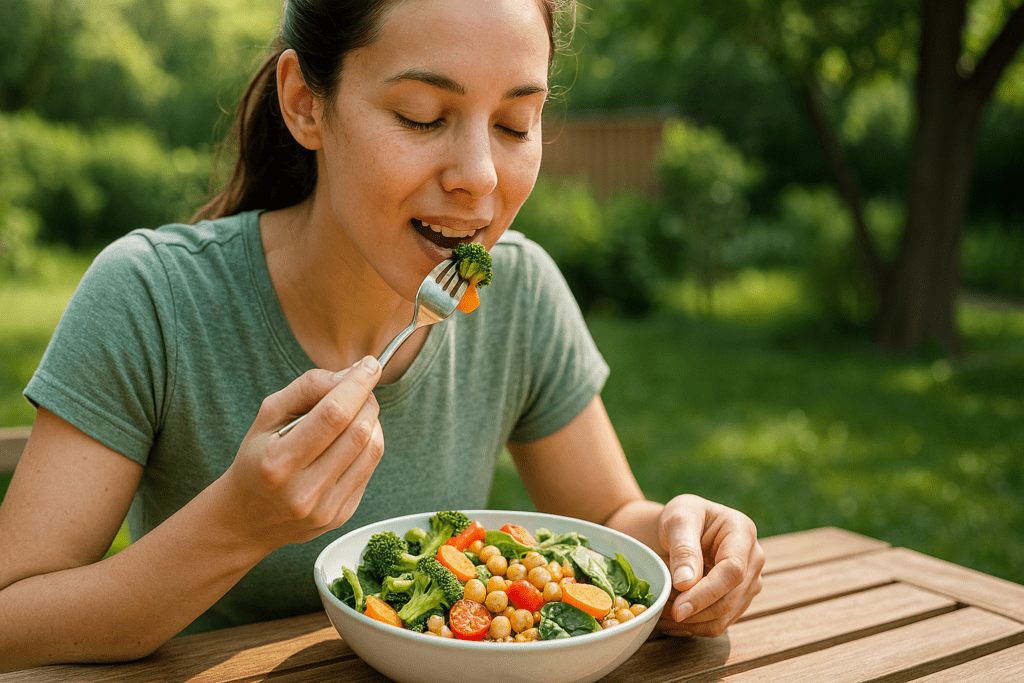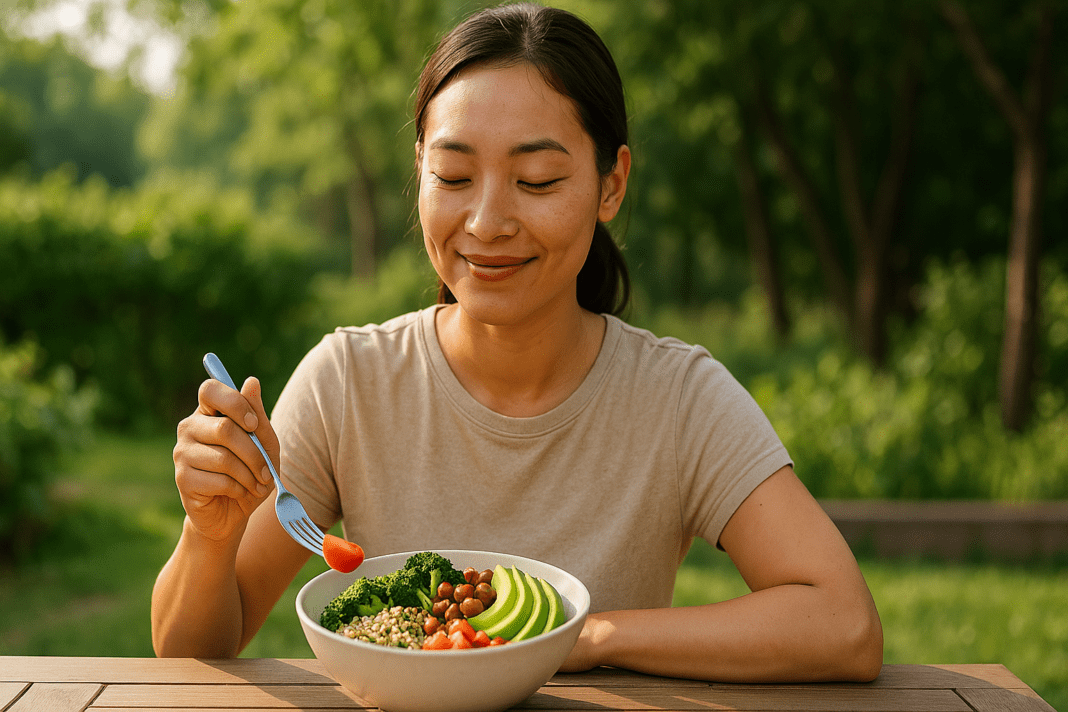The rising interest in plant-based living isn’t a passing trend—it’s a cultural shift powered by a growing body of evidence highlighting the health benefits of whole-food, plant-based diets. These diets are increasingly celebrated not just by nutritionists, but also by physicians, athletes, and wellness professionals who appreciate their profound impact on long-term health. Whether you’re aiming to manage your weight, lower inflammation, increase vitality, or simply nourish your body with cleaner fuel, the science is compelling. And the best part? Embracing this lifestyle doesn’t mean spending hours in the kitchen. With a little planning and the right recipes, it’s easy to enjoy easy healthy vegan meals that are not only nutritious but also satisfying and deeply flavorful.
You may also like: Healthy Plant-Based Dinners Made Easy: Best Whole Food Plant-Based Recipes for Beginners and Beyond
Plant-Based Nutrition: A Scientific Foundation for Health and Longevity
The concept of plant-based eating extends far beyond the avoidance of animal products. It emphasizes the inclusion of a wide variety of whole foods—vegetables, fruits, legumes, grains, nuts, and seeds—each brimming with nutrients that support health on a cellular level. Numerous peer-reviewed studies have confirmed the link between diets rich in whole plant foods and a lower risk of chronic diseases such as cardiovascular disease, type 2 diabetes, and certain cancers. For instance, the EPIC-Oxford study, which followed over 65,000 participants, found that plant-based eaters generally had lower body mass indexes and reduced rates of ischemic heart disease.
The power of this approach lies in its nutritional density. A bowl of lentil soup, a chickpea salad, or a veggie stir-fry offers not only macronutrients like protein and complex carbohydrates but also a wealth of micronutrients, phytochemicals, and fiber. These elements work synergistically to regulate blood sugar, reduce oxidative stress, support gut microbiota, and boost immune function. By centering meals around such ingredients, individuals can construct easy healthy vegan recipes that contribute significantly to their daily health goals while enhancing overall vitality.

Debunking Common Myths About Vegan Meals
A recurring misconception is that vegan meals lack protein or are inherently bland. However, nutrition science offers a different perspective. Legumes, tofu, tempeh, quinoa, and even leafy greens provide ample protein when consumed in adequate portions. In fact, the Academy of Nutrition and Dietetics has stated that appropriately planned vegan diets are healthful, nutritionally adequate, and may provide health benefits for the prevention and treatment of certain diseases.
Another myth is that preparing plant-based dishes is complicated or time-consuming. While gourmet vegan cuisine can certainly be intricate, everyday cooking need not be. With the increasing availability of fresh, frozen, and canned ingredients, crafting an easy healthy vegan meal can be quicker than ordering takeout. For example, a light vegan dinner might consist of sautéed greens with garlic and lemon, a side of roasted sweet potatoes, and a hearty lentil stew—all of which can be prepared in under 30 minutes.
Energy and Focus: How Vegan Meals Support Cognitive and Physical Performance
The relationship between nutrition and energy levels is deeply intertwined. Meals that are high in processed fats, refined sugars, and artificial additives often lead to energy crashes and brain fog. Conversely, meals rich in complex carbohydrates, plant-based proteins, and healthy fats support sustained energy and sharper focus. This is where easy healthy vegan recipes shine—they provide clean energy without the post-meal slump.
Studies show that high-antioxidant foods, like berries, spinach, and walnuts, may protect the brain from oxidative stress, a key contributor to cognitive decline. Omega-3 fatty acids, found in chia seeds, flaxseeds, and walnuts, are essential for brain health and can be easily incorporated into breakfast smoothies, oatmeal, or even baked goods. Meanwhile, iron-rich foods like lentils, tofu, and pumpkin seeds support oxygen transport in the blood, helping you stay energized throughout the day. When constructed thoughtfully, easy vegan healthy meals don’t just satisfy hunger—they fuel peak performance.
Simple Strategies for Building Easy Healthy Vegan Meals
Creating nutritious, satisfying vegan meals doesn’t require culinary training. It begins with understanding the components of a balanced plate: protein, fiber-rich carbohydrates, healthy fats, and colorful vegetables. For instance, a simple Buddha bowl combining quinoa, black beans, roasted vegetables, and avocado delivers a symphony of textures, flavors, and essential nutrients.
Batch cooking can also streamline the process. By preparing grains, legumes, and chopped vegetables in advance, you set the stage for effortless assembly during the week. Soups, stews, stir-fries, and grain bowls are especially well-suited for make-ahead preparation and provide endless opportunities for variation. Moreover, light vegan dinners such as zucchini noodles with cashew cream sauce or a chickpea and cucumber salad can be both refreshing and satisfying without weighing you down in the evening.
Understanding Flavor Profiles to Elevate Your Meals
One of the most overlooked elements of plant-based cooking is the power of herbs, spices, and umami-rich ingredients. These natural flavor enhancers transform simple dishes into vibrant culinary experiences. Smoked paprika, cumin, turmeric, and ginger not only add depth but also offer anti-inflammatory benefits. Nutritional yeast, miso, sun-dried tomatoes, and mushrooms bring savory richness that mimics the depth of flavor often found in animal-based dishes.
Incorporating these ingredients allows for the creation of easy healthy vegan meals that are exciting and satisfying. A lentil Bolognese with garlic, oregano, and tomato paste served over whole grain pasta offers a comforting, protein-rich dinner. Similarly, roasted cauliflower tossed with curry powder and paired with a tahini drizzle elevates a humble vegetable into a show-stopping centerpiece for a light vegan dinner.
Evidence-Based Health Benefits of Whole-Food Plant-Based Meals
The benefits of a plant-forward diet are well-supported by clinical research. One randomized control trial published in the Journal of the American College of Cardiology found that individuals following a whole-food, plant-based diet experienced significant reductions in LDL cholesterol and blood pressure. Additional studies suggest improvements in insulin sensitivity and reduced markers of inflammation.
These findings have profound implications for public health, especially considering the rise in chronic, lifestyle-related diseases. Easy healthy vegan recipes, when grounded in whole-food principles, offer a practical, scalable solution to these challenges. Moreover, because they tend to be lower in calories and higher in fiber, they naturally support weight management and digestive health. Meals like lentil chili, barley and mushroom risotto, or roasted vegetable wraps exemplify this balance of nutrition and convenience.
Adapting Traditional Dishes for Vegan Lifestyles
One of the most empowering aspects of vegan cooking is its adaptability. Nearly every cuisine offers traditional dishes that can be reimagined without animal products. For example, shepherd’s pie can be recreated using lentils and mashed cauliflower, while tacos can be filled with spiced tempeh, avocado, and fresh salsa. By substituting meat and dairy with plant-based alternatives, you can preserve the cultural richness of your favorite foods while improving their health profile.
This approach also makes it easier to stick to dietary goals without feeling deprived. By experimenting with familiar textures and spices, home cooks can create easy healthy vegan recipes that feel both comforting and novel. These adaptations are especially helpful for family meals, where different palates and preferences must be considered. A light vegan dinner such as vegetable sushi rolls or eggplant lasagna can appeal to both seasoned vegans and curious omnivores alike.
The Role of Gut Health in Plant-Based Wellness
Emerging research has emphasized the vital role of gut health in overall wellness, from immune resilience to mood regulation. The gut microbiome thrives on fiber, which is abundant in plant-based foods but virtually absent from animal products. Diets rich in legumes, fruits, vegetables, and whole grains promote the diversity and balance of gut bacteria, contributing to a robust immune system and optimal digestion.
Fermented foods like kimchi, sauerkraut, and tempeh further support gut health by introducing beneficial probiotics. Incorporating these into easy healthy vegan meals adds both flavor and function. For instance, a rice bowl topped with tempeh, pickled vegetables, and a sesame-ginger dressing provides a microbiome-friendly feast that’s as appealing to the palate as it is to the gut.
Meal Planning for Sustainable Success
Sustainability in plant-based eating is not just about environmental impact—it also refers to the ease with which individuals can maintain the lifestyle. Meal planning is key to this success. By setting aside time each week to organize recipes, shop for ingredients, and prep components, you remove many of the barriers that lead to unhealthy or impulsive food choices.
Incorporating go-to staples like oats, chickpeas, brown rice, and frozen vegetables allows for endless meal variations with minimal effort. For instance, one batch of chickpeas can be used in a Mediterranean salad, a curry, and a blended hummus. Likewise, pre-cooked quinoa can serve as the base for a hearty grain bowl one day and a breakfast porridge the next. Such strategies make it easier to build easy vegan healthy meals that fit seamlessly into even the busiest schedules.
Balancing Macronutrients for Optimal Wellness
Ensuring macronutrient balance is essential in any diet, and plant-based eating is no exception. While carbohydrates are often abundant in vegan meals, it’s important to include sufficient protein and healthy fats to support satiety and muscle repair. Ingredients like lentils, tofu, tempeh, and edamame provide high-quality plant proteins, while avocados, nuts, and seeds contribute essential fatty acids.
Combining these elements thoughtfully results in meals that are both delicious and nutritionally complete. A quinoa salad with edamame, avocado, chopped kale, and tahini dressing offers a blend of all three macronutrients in a single bowl. This not only aids in nutrient absorption but also keeps energy levels stable throughout the day. Such meals demonstrate that easy healthy vegan recipes can support both physical vitality and long-term wellness without the need for supplements or processed foods.
The Social and Environmental Case for Vegan Eating
While the health benefits of veganism are well-established, its positive impact on the planet and society is equally compelling. Livestock farming is a major contributor to greenhouse gas emissions, deforestation, and water pollution. By choosing plant-based foods, individuals can significantly reduce their ecological footprint. In fact, a report from the University of Oxford found that adopting a vegan diet could reduce food-related emissions by up to 73%.
Moreover, plant-based diets promote food equity and resource efficiency. Crops used to feed livestock could instead be redirected toward feeding humans directly, reducing global hunger and conserving vital resources. By sharing easy vegan healthy meals with friends and family, individuals can inspire broader cultural shifts toward sustainability and wellness.
Finding Joy in Plant-Based Living
Ultimately, the success of any dietary approach hinges on satisfaction and enjoyment. Vegan eating should never feel like a chore. With creativity, cultural inspiration, and a spirit of exploration, it’s entirely possible to craft meals that are both deeply nourishing and pleasurable. From creamy coconut lentil curries to vibrant summer rolls with peanut dipping sauce, the possibilities are endless.
By leaning into seasonal ingredients, embracing global flavors, and focusing on quality over quantity, anyone can discover the joy of plant-based cooking. Easy healthy vegan recipes don’t need to be complicated to be delicious. A simple light vegan dinner shared with loved ones can provide not only nutrition but also connection and comfort.

Frequently Asked Questions (FAQ) About Easy Healthy Vegan Recipes and Plant-Based Eating
1. What are some time-saving techniques for preparing easy healthy vegan meals during a busy workweek?
Time efficiency is one of the most common challenges for those transitioning to plant-based diets, especially during hectic schedules. A strategic method to overcome this is by dedicating an hour on Sundays to batch-cook foundational ingredients—think quinoa, lentils, and roasted vegetables—that can be stored and recombined throughout the week. Pre-chopping ingredients and using airtight containers can make weekday assembly for easy healthy vegan recipes both fast and stress-free. Another lesser-known trick is freezing smoothie packs with leafy greens, fruit, and seeds, so you can blend a complete breakfast in under a minute. These practical approaches ensure that eating well isn’t reserved for weekends and make it possible to enjoy a light vegan dinner or a filling lunch even on your busiest days.
2. How can I ensure I get enough protein when eating only easy vegan healthy meals?
Protein sufficiency on a vegan diet is more attainable than commonly believed, particularly when meals are diversified and thoughtfully planned. Many easy vegan healthy meals use complete proteins like quinoa, buckwheat, or soy-based products such as tempeh and tofu. Even less obvious sources, like whole grains paired with legumes, form complete amino acid profiles when consumed over the course of a day. To add variety and boost protein, incorporate spirulina powder into smoothies or hemp seeds into salads. With some planning and awareness, every light vegan dinner or simple lunch can include all the protein your body needs without relying on supplements.
3. What are some creative ways to avoid repetitive flavors in easy healthy vegan recipes?
Flavor fatigue is a real concern, even in nutrient-dense diets. To prevent this, diversify your spice palette by exploring global cuisines—try using Berbere spice from Ethiopia, Za’atar from the Middle East, or gochujang from Korea to reinvent your staples. Also, rotating cooking techniques—like roasting, steaming, stir-frying, and grilling—can drastically shift the taste and texture of the same ingredients. Fermented additions like kimchi or pickled onions bring brightness and depth to easy vegan healthy meals without adding extra calories. For a comforting and dynamic light vegan dinner, consider using different plant-based sauces like miso-tahini, almond romesco, or avocado-lime drizzle to elevate everyday veggies.
4. Can light vegan dinners still be filling and satisfying?
Absolutely—light does not have to mean insubstantial. A light vegan dinner typically focuses on digestion-friendly ingredients with high fiber content and balanced macronutrients. Think roasted butternut squash with arugula and lentils, or a warm bowl of miso broth with soba noodles and bok choy. These meals offer satiety without the sluggishness that often follows heavier dishes. For extra satisfaction, include healthy fats like olive oil, tahini, or avocado, which add creaminess and richness to otherwise simple dishes. Even when aiming for a lighter evening meal, easy healthy vegan recipes can deliver both nourishment and indulgence.
5. How do easy healthy vegan recipes support long-term metabolic health?
Research increasingly shows that diets based on whole plant foods can positively influence metabolic markers such as insulin sensitivity, lipid profiles, and body composition. Many easy healthy vegan meals are naturally low in saturated fats and high in fiber, which can help stabilize blood sugar levels and improve gut hormone response. When blood glucose and insulin are kept within optimal ranges, the risk of developing metabolic syndrome or type 2 diabetes decreases significantly. Meals rich in legumes, whole grains, and cruciferous vegetables have been particularly associated with these benefits. Integrating a variety of these foods into your routine not only sustains energy but also builds a foundation for lifelong metabolic wellness.
6. Are there any tools or kitchen gadgets that can simplify the process of making easy vegan healthy meals?
Yes, the right tools can turn meal prep from a chore into a pleasure. A high-speed blender makes quick work of soups, smoothies, and sauces—essential elements in many easy healthy vegan recipes. An Instant Pot or pressure cooker reduces cooking time for beans and grains by more than half, making weeknight meals much faster to prepare. A mandoline slicer helps achieve uniform, thin vegetable slices for salads or baked chips, while an air fryer adds crisp texture to dishes with little to no oil. Investing in these tools can streamline the process and make it easier to prepare a light vegan dinner even after a long day.
7. How can someone new to veganism gradually incorporate easy healthy vegan recipes into their diet without feeling overwhelmed?
Transitioning to a plant-based lifestyle doesn’t need to be abrupt or overwhelming. One effective method is starting with one fully vegan meal per day—many choose breakfast or a light vegan dinner as a gentle entry point. Over time, build a go-to list of five to seven easy vegan healthy meals you enjoy and can rotate through the week. It also helps to “veganize” your favorite comfort foods; swapping meat for lentils in a shepherd’s pie or using cashew cream in pasta can make the change feel seamless. Gradual integration fosters sustainability and allows your palate and lifestyle to adjust at a natural pace.
8. What are the mental and emotional benefits of consistently eating easy vegan healthy meals?
Although often overlooked, the psychological impact of plant-based eating is notable. Many individuals report experiencing increased mental clarity, mood stability, and even a heightened sense of emotional well-being after consistently consuming easy healthy vegan recipes. This can be attributed in part to reduced inflammation and improved gut health—both linked to mood regulation through the gut-brain axis. Furthermore, the act of mindfully preparing colorful, nutrient-dense meals can serve as a daily form of self-care and grounding. A light vegan dinner, rich in magnesium and B-vitamins, may even support more restful sleep and stress resilience.
9. How can easy vegan healthy meals accommodate different cultural traditions and flavors?
One of the great strengths of plant-based eating is its adaptability across cultures. Easy healthy vegan recipes can draw inspiration from Indian dal, Thai curry, Ethiopian injera with lentils, or Mexican vegetable tamales, to name just a few. Incorporating traditional spices and preparation methods allows individuals to stay connected to cultural roots while aligning with modern nutritional goals. For families with diverse tastes, this cultural versatility means there’s always a way to prepare a delicious and inclusive light vegan dinner. By respecting both heritage and health, the plant-based plate becomes a space for creative and communal expression.
10. What are some future trends in easy healthy vegan meals to look out for?
As plant-based lifestyles continue to grow, the next generation of easy vegan healthy meals is poised to become even more exciting. Innovations like cell-based meat alternatives, high-protein legumes like lupin, and regenerative agriculture crops will redefine how we approach sustainability and flavor. Culinary schools are expanding plant-based curriculums, signaling a shift in professional food culture toward more inclusive and nutrient-rich menus. Home cooks can also expect a surge in smart kitchen apps and AI-driven meal planning tools that make customizing easy healthy vegan recipes more accessible. As awareness grows, even the simplest light vegan dinner will reflect a fusion of tradition, technology, and nutrition science.

A Nourishing Future Through Easy Healthy Vegan Recipes
As the intersection between health, sustainability, and culinary creativity continues to grow, so does the relevance of easy healthy vegan recipes in our everyday lives. These meals serve as more than just sustenance—they’re a powerful tool for enhancing energy, preventing disease, and promoting well-being across all dimensions of life. When grounded in science and enriched by diverse flavors, plant-based dishes become not only nourishing but transformative.
The beauty of this lifestyle lies in its accessibility. Anyone, regardless of cooking skill or background, can begin incorporating easy vegan healthy meals into their routine with immediate benefits. Whether it’s a light vegan dinner to end the day or a hearty lunch to power through the afternoon, these meals offer a pathway to sustained energy and long-term wellness without compromise. By embracing this way of eating, we don’t just feed our bodies—we empower them.
Further Reading:
A Complete Vegan Meal Plan and Sample Menu
7-Day Plant-Based Diet Meal Plan for Beginners, Created by a Dietitian
What is a plant-based diet and why should you try it?
Disclaimer
The information contained in this article is provided for general informational purposes only and is not intended to serve as medical, legal, or professional advice. While NewsHealthWatch strives to present accurate, up-to-date, and reliable content, no warranty or guarantee, expressed or implied, is made regarding the completeness, accuracy, or adequacy of the information provided. Readers are strongly advised to seek the guidance of a qualified healthcare provider or other relevant professionals before acting on any information contained in this article. NewsHealthWatch, its authors, editors, and contributors expressly disclaim any liability for any damages, losses, or consequences arising directly or indirectly from the use, interpretation, or reliance on any information presented herein. The views and opinions expressed in this article are those of the author(s) and do not necessarily reflect the official policies or positions of NewsHealthWatch.

